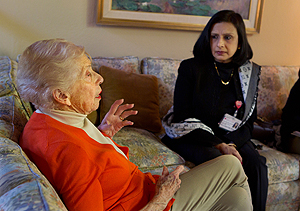June 20, 2011 - By Sara Wykes

Rita Ghatak of the Stanford Dementia Support Program listens to Beverlee White at an initial meeting at White's home. White has a mild but progressive cognitive deficit that may augur the onset of dementia.
Rita Ghatak leaned toward Beverlee White. “Do you have any special needs or concerns?” she asked.
White, 85, appeared in excellent health. Sitting comfortably in her Cupertino townhome, she was immaculately groomed and dressed — and quick to articulate her frustrations. She described a fall she’d taken in her bathroom, the car accident she’d had that led her to give up her driver’s license, the trouble she has with numbers.
“My memory is not perfect,” White said.
Neurologists had recently diagnosed White with a mild but progressive cognitive deficit — a warning sign of dementia. Ghatak, a PhD in psychology and elder care expert who heads Stanford Hospital’s Aging Adult Services, was there to offer the help of the Stanford Dementia Support Program.
The program can be traced back to three years ago when Ghatak began to notice a trend. More and more of the people who came to her Aging Adult Services office at Stanford Hospital & Clinics were there because of a dementia diagnosis. And she was being called more to the emergency room, where a family had brought in someone with dementia, in crisis.
“People were exhausted and in despair,” Ghatak said. “They needed support and direction and an understanding of dementia symptoms and behavior changes.” Support for those families has been the great unspoken need, Ghatak said.
Ghatak was well-practiced at handling short-term issues like follow-up care for people just discharged from the hospital after a major surgery or help to manage a chronic condition like arthritis. The disease of dementia, she said, requires something more. “It must have a constant continuum of care and a more family-centered approach.”
The scope and magnitude of the need was clear. When Ghatak looked at the numbers first, in 2008, nearly 30 million people worldwide had some form of dementia; more than 10 million people were caring for them. Few of those caregivers had any medical training. Few hospitals had organized programs to offer the kind of support Ghatak envisioned for families after a dementia diagnosis. (Alzheimer's disease is the most common form of dementia.)
With support from Stanford Hospital administrators, Ghatak designed a multi-layered, cross-disciplinary dementia support program. More than 330 families have since found help there, with the program as their guide and partner. The program’s package of education, consultations, home visits, family meetings, care coordination and ongoing status updates to physicians is unusual in its comprehensive view. Ghatak now speaks nationally and internationally about its structure and success.
Each week, Ghatak makes several visits like the one to White’s home in Cupertino. Ghatak and her staff begin by learning the details of a patient’s daily life. “That will define what the disease has already done,” she said. “How much help is that person needing?” Gathering information is the first step in helping people with dementia.
“We are here to listen,” Ghatak told White. “We want to know what you want.”
“I’ve never been old before,” White said, “so most of the time I don’t know what to expect.”
It is an extended conversation that White and Ghatak have, and it is to be followed by many more.
This and other home visits that Ghatak makes tell her just what kind of support and structure is needed. Then, she and her staff pull together resources for that support and structure — special adaptive equipment, for instance. Families might need the help of a professional caregiver or an adult day health program that accepts patients with dementia.
The program’s hallmark is its recognition that the impact of a dementia diagnosis spreads beyond each patient. “Dementia is an incredibly devastating disease on a personal level for the patient, but it has a remarkable amount of spillover to the immediate family and extended neighbors,” said Michael Greicius, MD, medical director of the Stanford Center for Memory Disorders. “Every day and every week caregivers face dozens of obstacles and concerns. It’s everything from insurance to how long to keep patients at home — and the inevitable guilt that comes from not being able to care for a person at home any more. There is really heavy emotional fallout, so having a person like Dr. Ghatak and a program like ours is particularly important.”
Often what Ghatak suggests are environmental changes: People with dementia are often bothered by loud noises or changes in routine, so stick to routine and keep conversations in low tones. Agitation can be reduced if, instead of correcting statements, the response is to agree or to redirect the conversation.
“A lot of people with dementia are able to live very good lives given proper structure,” Ghatak said. “We can preserve a lot of normalcy provided there is support.”
Sara Wykes is a writer in the Stanford Hospital & Clinics communications office.
About Stanford Medicine
Stanford Medicine is an integrated academic health system comprising the Stanford School of Medicine and adult and pediatric health care delivery systems. Together, they harness the full potential of biomedicine through collaborative research, education and clinical care for patients. For more information, please visit med.stanford.edu.